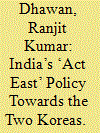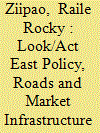| Srl | Item |
| 1 |
ID:
162718


|
|
|
| 2 |
ID:
162716


|
|
|
| 3 |
ID:
162711


|
|
|
|
|
| Summary/Abstract |
Energy security has evolved to become strategically important for countries, such that the domestic availability of energy resources, coupled with the national energy demand, as well as import and export dependencies on energy resources, have important implications for a country’s economic growth, human development and strategic autonomy. This is especially important for India, which is heavily dependent on imports to meet its domestic energy demand. In India, the fragmentary nature of the institutional apparatus of the energy sector serves to become one of the major limitations on the process of energy policy-making. It leads to competitive and clashing interests, overlapping areas of responsibility and ambiguous lines of command leading to unintended costs, delays and overall incoherence. This article studies the dynamics of energy policy-making in India by exploring the processes of decision-making in the energy sector. It examines the structural challenges linked to systemic conditions and institutional capacities, as well as the functional challenges linked to legislations, policies, politics and personalities in the area of policy-making in the energy sector by studying the roles of various institutions relevant to policy-making, as well as the processes of decision-making specific to given institutions in the energy sector.
|
|
|
|
|
|
|
|
|
|
|
|
|
|
|
|
| 4 |
ID:
162714


|
|
|
|
|
| Summary/Abstract |
This article employs the 3-i framework to explore the institutions, ideas, and interests that have shaped the Bangladesh government’s policy choices for implementing the Rooppur Nuclear Power Plant, the first such plant in the country. The logic behind three choices—vendor country, reactor model, and spent fuel management—are analysed. The findings reveal an interactive policy process, involving various domestic and international institutions, whose ideas regarding project funding, reactor safety, technical expertise and calculation of financial, organisational and political interests have played a key role in shaping the choices of Bangladesh.
|
|
|
|
|
|
|
|
|
|
|
|
|
|
|
|
| 5 |
ID:
162713


|
|
|
|
|
| Summary/Abstract |
The Narendra Modi government after coming to power in May 2014 initiated the ‘Act East’ policy to further enhance New Delhi’s engagement with the countries of the Asia-Pacific region. However, India’s engagement with the two Koreas has not seen any significant improvement under the Modi government. North Korea’s isolationist policies and its involvement with India’s neighbouring countries with regard to the proliferation of nuclear and missile technologies have proved detrimental for relations between New Delhi and Pyongyang. Following the United Nations Security Council resolutions India has restricted its trade relations with North Korea since 2017, except for food and medical assistance to this reclusive state. On the other hand, India’s interest in South Korea also appears to have waned as bilateral trade relations have not witnessed any dramatic improvement in recent years. Despite South Korea’s claims of being a ‘middle power’ country, its reluctance to take a stand on several issues that concern India has diminished hopes for further improvement in relations between New Delhi and Seoul. This article seeks to discuss the issues and challenges that hamper the improvement of relations between India and the two Koreas in the context of the Modi government’s ‘Act East’ policy.
|
|
|
|
|
|
|
|
|
|
|
|
|
|
|
|
| 6 |
ID:
162715


|
|
|
| 7 |
ID:
162712


|
|
|
|
|
| Summary/Abstract |
The socio-politico-economic scene in India’s North-east region has guided certain aspects of the country’s domestic and international policy. The Act East Policy (AEP) of the government of India aims to build relations with the countries of South-East Asia, including trade relations, for which the north-east serves as the gateway. This article seeks to analyse the relevance of the policy: How is it grounded in the complex region of north-east India? In what way can it impact the region? The article argues that the new national road infrastructure bypasses the local economy, and posits the need to link rural infrastructure—especially connectivity and local markets—with regional, national and international markets.
|
|
|
|
|
|
|
|
|
|
|
|
|
|
|
|
| 8 |
ID:
162717


|
|
|